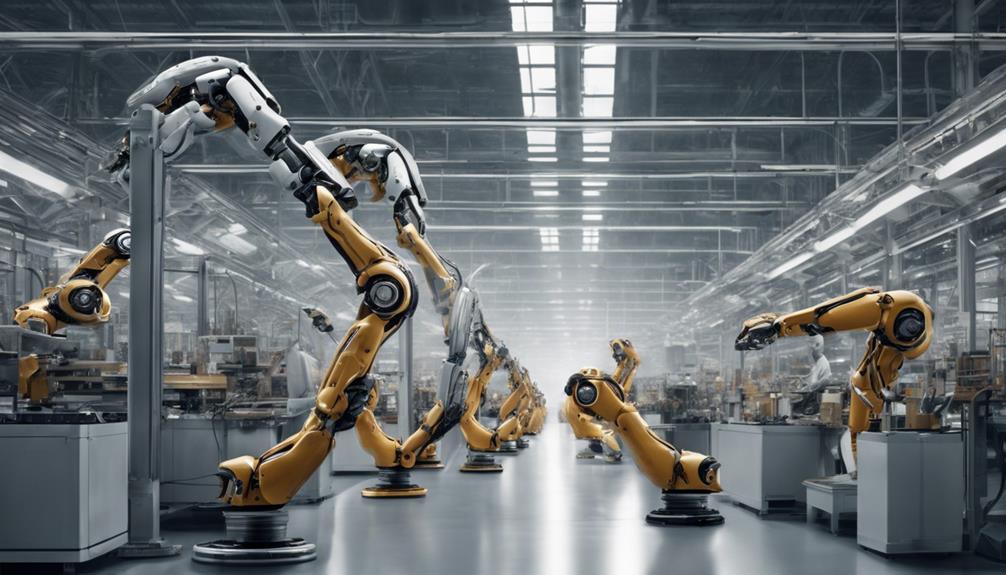Artificial Intelligence (AI) has become a prominent feature in the current labor market, revolutionizing industries and changing the landscape of work. As AI technology advances quickly, the key question remains: How will AI impact the future of jobs?
The comprehensive guide provides insight into the sectors most vulnerable to automation, shedding light on the impending changes in job landscapes across the globe. Stay tuned to uncover the intricate web of implications and strategies in navigating an AI-dominated job market.
Key Takeaways
- AI will replace jobs in customer service, driving, programming, and research analysis.
- Professions requiring emotional intelligence and creativity are less susceptible to AI replacement.
- AI technology can create new jobs, boost productivity, and enhance legal compliance.
- Transition strategies include lifelong learning, soft skill development, specialization, and agile learning.
Impact of AI on Job Market
The disruptive impact of Artificial Intelligence (AI) on the job market is evidenced by projections indicating the replacement of 85 million jobs globally by 2025, particularly affecting industries such as healthcare, agriculture, and industrial sectors. Research suggests that roles like customer service representatives, paralegals, and other positions involving repetitive tasks are at risk of being replaced by AI technologies. Machine learning algorithms are increasingly capable of handling customer service inquiries, leading to potential job loss in this sector. Additionally, tasks traditionally performed by paralegals, such as legal research and documentation, are being automated, reducing the need for human intervention in these areas.
As AI continues to advance, the job market will demand new skills to complement automation. Jobs requiring a human touch, like those in teaching, nursing, therapy, and skilled trades, are less likely to be fully replaced by AI. These roles rely on complex human interactions and emotional intelligence, areas where machines currently struggle to replicate human capabilities. Therefore, while AI will undoubtedly lead to job displacement in certain sectors, it also presents opportunities for upskilling and focusing on uniquely human skills that machines cannot replicate.
Jobs AI Will Replace

How will the integration of AI impact the future job prospects in various industries?
Across different sectors, AI is poised to replace certain roles through automation and advanced technologies. Customer service representatives face job displacement as AI-driven chatbots and automation systems efficiently handle customer inquiries.
The rise of autonomous vehicles poses a threat to car and truck drivers, potentially reducing the need for human operators. Additionally, AI tools like ChatGPT are automating tasks traditionally performed by computer programmers, raising questions about the balance between speed and quality in coding processes.
Research analysts are also at risk as AI can effectively conduct market and financial analysis, potentially taking over some of their responsibilities. Furthermore, paralegals may see automation impacting their roles, with AI handling administrative tasks and data processing more effectively.
As AI continues to advance, these job roles are likely to experience significant transformation and displacement due to automation and technological advancements.
Jobs AI Won't Replace
In professions that demand high levels of emotional intelligence and nuanced human understanding, the impact of artificial intelligence on job displacement is considerably minimal. Jobs such as teachers, therapists, and healthcare professionals rely heavily on human interaction, empathy, and critical thinking, which are skills that AI currently struggles to replicate. The intricate nature of personal relationships and the need for creativity in roles like education and skilled trades provide a level of job security against automation.
Professions requiring emotional intelligence and a deep understanding of human behavior are less susceptible to AI replacement. While artificial intelligence can assist in certain tasks within these fields, the essence of these roles lies in the ability to connect with individuals on a personal level. The complexity of human emotions and the need for empathetic responses make jobs like therapists and educators essential in a world where AI cannot fully grasp the intricacies of human interaction. In essence, the future of work will likely see AI augmenting rather than replacing roles that hinge on creativity, empathy, and critical thinking.
Benefits of AI in Workforce

Professions embracing the integration of artificial intelligence can significantly benefit from increased productivity, efficiency, and profitability, as evidenced by the potential $33 trillion in savings forecasted for businesses by 2030. AI technologies offer a multitude of advantages in the workforce:
- Creation of New Jobs: AI technology is projected to create 58 million net new jobs by 2022, according to the World Economic Forum. These new roles will require workers to embrace AI and develop the necessary skills to excel in the evolving job market.
- Enhanced Worker Productivity: Companies that successfully integrate AI technologies can experience a 54% increase in employee productivity. This boost in efficiency allows workers to focus on high-value tasks while AI handles repetitive or mundane activities.
- Legal Compliance and Data Security: AI can help businesses navigate complex legal frameworks by ensuring compliance and enhancing data security measures. This capability reduces the risk of legal issues and protects sensitive information, contributing to a more secure work environment for employees.
Embracing AI in the workforce not only creates new opportunities for workers but also enhances productivity, efficiency, and legal compliance, fostering a positive environment for future job growth.
Strategies for AI Workplace Transition
The integration of artificial intelligence into the workforce demands a strategic approach to navigate the evolving job landscape effectively. To excel in the emerging job market heavily influenced by AI technologies, individuals must prioritize lifelong learning and the development of soft skills. Specializing in specific areas and integrating AI into everyday tasks are crucial steps towards ensuring job market success. Being agile in learning new skills and leveraging AI technologies can help individuals adapt and thrive in the changing job landscape.
| Strategies for AI Workplace Transition | Benefits |
|---|---|
| Embrace lifelong learning | Stay relevant and adaptable in AI-driven environments |
| Develop soft skills | Enhance communication and problem-solving abilities |
| Specialize in specific areas | Stand out in the job market with in-demand expertise |
| Familiarize with AI technologies | Utilize AI tools for efficient decision-making |
| Practice agile learning | Quickly adapt to new skills and technologies |
Frequently Asked Questions
What Are the Jobs That AI Will Replace?
AI is projected to replace jobs across various sectors. Roles like customer service representatives, drivers, programmers, research analysts, and paralegals are at risk of automation. AI-driven technologies such as chatbots, autonomous vehicles, and generative tools are driving this shift.
How Will AI Replace Human Work?
AI will replace human work through automation, data analysis, and machine learning algorithms. By streamlining processes, enhancing efficiency, and reducing errors, AI will reshape industries, leading to job displacement but also new opportunities for specialized roles.
What Jobs Will Be Most Affected by Ai?
Jobs with salaries exceeding $90,000 are most vulnerable to automation, with legal occupations facing a 78% risk of obsolescence by 2023. AI advancements are reshaping the job landscape, impacting white-collar workers significantly.
Will AI Create Jobs or Replace Jobs?
AI's impact on job creation is complex. While it will replace some roles, it also generates new opportunities in fields like machine learning and AI ethics. The shift will require reskilling and adaptation to harness the potential of AI in the workforce.
Conclusion
In conclusion, the evolving landscape of artificial intelligence presents both challenges and opportunities for the job market. While certain roles are at risk of being replaced by AI, there are also new job opportunities emerging in fields like machine learning.
By understanding the impact of AI on various industries and implementing strategic transitions, individuals can navigate the changing workforce successfully. It is imperative to adapt to the advancements in AI to stay competitive in the future job market.









